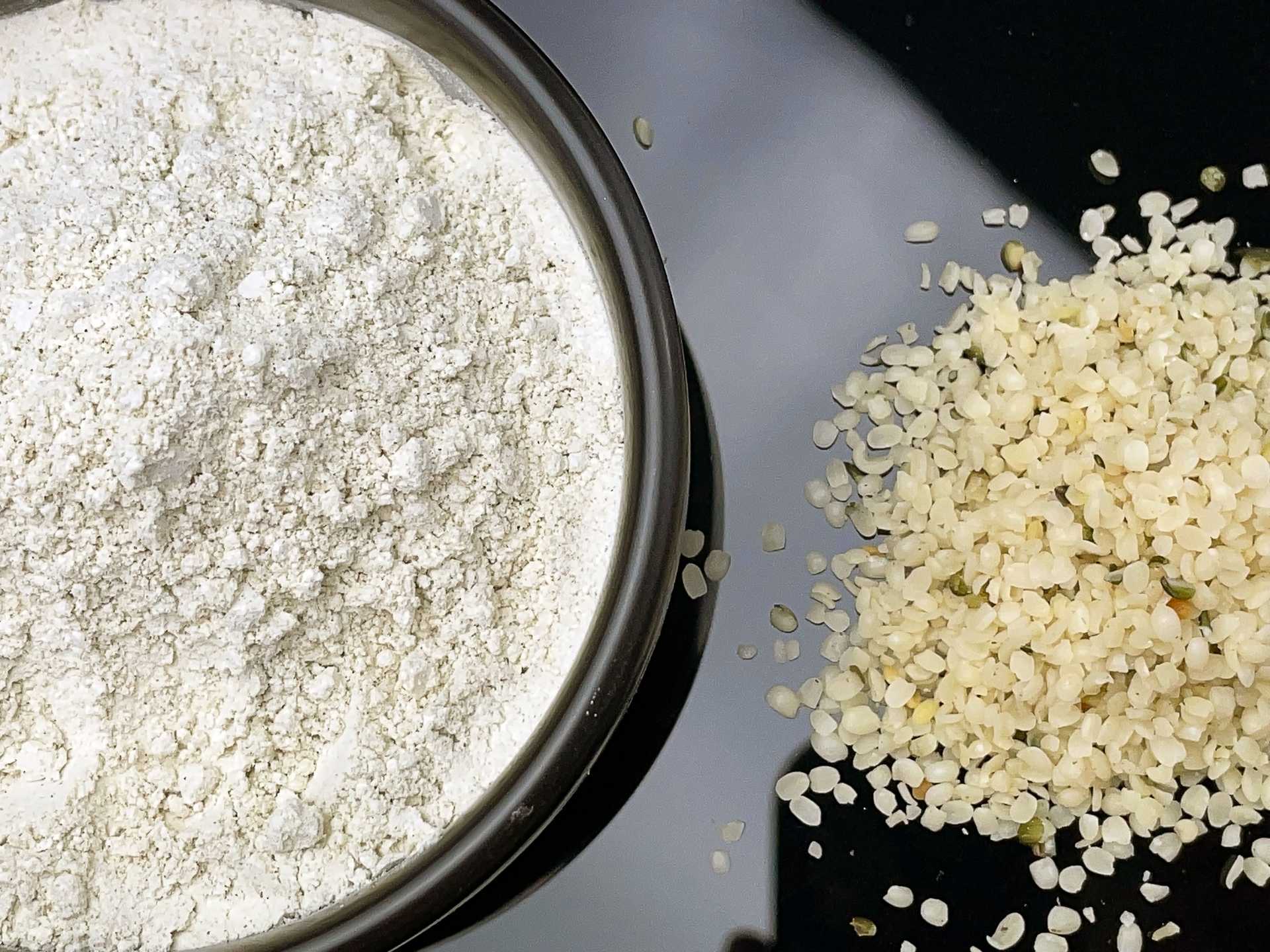
Introduction
What is Hemp Protein?
Hemp protein, or hemp flour, is obtained from the seeds of the hemp plant. As a vegan protein source with a nutty and slightly earthy taste, it is ideal for not only athletes for natural muscle-building, but also people who look after their natural protein and vitamin balance for the betterment of their bodies. Hemp protein has a high bio-availability and contains a wealth of nutrients that are vital for humans.
Hemp protein comes in different grades of quality and colour depending on the protein content and manufacturing process. The classical green hemp protein is manufactured from the dry remains of pressed, unpeeled hemp seeds and contains a lot of fibre and chlorophyll, resulting in a more herbal taste. Its protein contents reach up to 50%.
Besides, white hemp protein is obtained by processing the remains of pressed peeled hemp seeds. It therefore contains much less fiber and almost no chlorophyll. This leads to a very neutral and slightly nutty taste. With its up to 80% protein concentration, it is perfectly suited for high-protein nutrition.
Nutrients
Why is Hemp Protein a Superfood?
Hemp protein consists of up to 80% protein and contains all the amino acids that are important for the body. Amino acids are the basic building blocks for proteins and are therefore fundamental for our body. Besides building muscles, they can also form organs, skin, and hair. Enzymes also consist of amino acids, which in turn are needed for all biochemical processes.
About 65% of the proteins contained in hemp protein consist of the natural, easily digestible protein edestin, a so-called storage protein. The name storage protein comes from the fact that edestin can store nutrients for muscle growth. This is why hemp protein is very popular among bodybuilders. The remaining 35% is albumin, a high-quality protein whose structure is similar to that of the protein in a chicken egg. About 50% of the protein content in blood plasma consists of albumin. It is also considered a transport protein for magnesium and calcium, for example.
The amino acids contained in hemp protein include branched-chain amino acids, which are also very important for building muscle. These so-called BCAAs (Branched Chain Amino Acids) are valine, leucine, and isoleucine. They are classified as essential amino acids, which means that our body cannot produce them on its own. Instead, we have to supply them to the body through our food. In addition to building muscles, the BCAAs also help with rapid regeneration after exercise, another reason why hemp protein is very interesting for sportsmen and sportswomen.
Due to a high proportion of the amino acid L-arginine, hemp protein is said to have blood pressure-lowering and potency-promoting properties. L-arginine therefore not only supports our blood pressure, but also our circulatory system. Since the protein composition of hemp protein is very similar to that of the human body, it is said to have a high value or high bioavailability. In effect, this means that the proteins can be absorbed very well by the human body and ultimately converted into the body’s own proteins. The high bioavailability also means that fewer waste products have to be metabolised. Consequently, compared to the consumption of other protein sources, the kidneys and liver, among others, are less stressed.
Vitamins, minerals, and trace elements contained in hemp protein include vitamin E, magnesium, iron, zinc, and potassium. Furthermore, hemp protein is rich in omega-3 and omega-6 fatty acids. These are in an ideal ratio of 1:3 to each other, which results in anti-inflammatory properties. The dietary fibres contained in hemp protein promote digestion, and the chlorophyll it contains helps with detoxification and can support the fight against skin problems. With up to 700 mg per 100 g, hemp protein contains an impressive amount of the vital mineral magnesium. A sufficient magnesium supply can counteract the following diseases: diabetes, cardiovascular diseases, and migraine. Thus, the protein extracted from the hemp plant has an impressive nutrient profile.
~65% of hemp protein is edestin. It can store nutrients for muscle growth.
~35% of hemp protein is albumin. It transports e.g. magnesium and calcium. It has a structure similar to that of the protein in a chicken egg
Valine, leucine, and isoleucine. In addition to building muscles, the BCAAs also help with rapid regeneration after exercise.
Supports our blood pressure and circulatory system




Highlight
Benefits of Hemp Protein
Hemp protein performs very well compared to other, conventional and plant-based protein sources.
Great Micronutrient Content
Hemp protein has a great micronutrient content with high amounts of minerals and antioxidants such as magnesium, calcium, iron, zinc, and copper. Something special about hemp protein in comparison to pea protein is the essential 3:1 balance of Omega-6 to Omega-3 fatty acids. Those help with improving heart, joints, and brain health.
High Protein Quality
Hemp is not an isolated source of protein but also contains carbohydrates and fat. Hemp is considered a complete protein. This means it contains all 9 essential amino acids.
Amino-Acid Composition
Hemp protein may be lacking in high amounts of methionine, but therefore has a higher level of the amino acid arginine, which is important for blood flow regulation, toxin removal, and immune function.
Environmental Benefit
Hemp is basically nature’s purifier. The plant binds carbon dioxide from the atmosphere, quickly purifying the air we breathe. In fact, each ton of hemp produced absorbs up to 15 tons of CO2, making hemp a much more effective carbon dioxide absorber than trees.
Pleasant Taste
Hemp protein has a faintly nutty flavour that enhances the taste of shakes, oatmeal, and cereal.
Easily Digestible
Protein gained from hemp is free of trypsin-inhibiting factors and therefore easily digested by the body. It is very gentle on the digestive system and does not cause any bloating or cramps. It is free from dairy, lactose, or soya and therefore allergen-free.
Meal Replacement
Hemp protein will keep you full for quite a long time since it has higher amounts of fibre and fat and can act as a great meal replacement.
Health Benefits
Hemp is a source of fibre and heart-healthy fats. It contains omega 3 fats, which promote healthy brain development. Hemp also contains all of the essential amino acids, making it a complete protein. It’s also free from allergens.

Comparison
Disadvantages of Other Proteins
Apart from the fact that whey protein is not suitable for people who are on a purely plant-based diet, it also comes with some other disadvantages. For example, it can promote fatigue and digestive problems due to the frequent lack of fibre. For this reason, there is also a risk of intestinal toxicity when consuming whey protein. This can cause the protein to remain in the digestive system for too long. Eventually leading to the opposite effect of taking protein powders: muscle breakdown, as the body is no longer able to continue muscle metabolism.
Many essential amino acids are present in the vegan rice-based protein source, but not all of them as they are in hemp protein. Soy protein also has a high vitamin and mineral content, but can promote allergies and cross-allergies. In addition, the essential amino acid methionine, which is important for bone formation, is only present in small quantities. Although soy has a higher protein content than hemp flour, it also has so-called trypsin inhibitors. Trypsin is a very important digestive enzyme that breaks down large protein compounds into smaller parts. It thus digests proteins. The trypsin inhibitors (“inhibitor” Latin for “prevent”) now prevent this important step of protein digestion.
Whey Protein
Health | Whey has traditionally been a valuable source of protein due to its high nutritional value and rapid absorption capacity. However, whey protein is also an allergen and should therefore not be included in the diet of individuals who are allergic or sensitive to dairy products.
Taste | Raw whey protein powder has a slightly chalky taste with a hint of cheese and milk. It doesn’t taste very good on its own, which is why it’s usually flavored.
Environmental Impact | Whey protein is an animal protein derived from cow’s milk. Animal agriculture has a harmful effect on the climate: It causes enormous amounts of harmful greenhouse gas emissions.
Soy Protein
Protein Digestibility | The protein digestibility of soya depends on its form. Soya protein isolate has a digestibility rating that is equivalent to animal-based protein. Protein gained from raw, whole soyabeans contains a high number of trypsin inhibitors, which make it hard for the body to absorb the protein.
Digestive System | Since soy proteins are usually heated during production, the protein’s ability to act as an enzyme is inhibited. Many people suffer from various digestive disturbances like bloating.
Environmental Benefit | Most of the soya that’s currently grown is genetically modified, which means that synthetic chemicals and fertilisers are typically used to efficiently grow soyabeans. Soya is grown in areas that used to be forests and using heavy machinery—and those methods generate greenhouse gases, compact soil, and can lead to soil erosion.
Rice Protein
Protein Quality | Rice is not considered to be a complete protein. It does not contain all of the essential amino acids because it lacks lysine. This means that you'd have to combine rice protein with another protein source to get all of the essential amino acids.
Environmental Impact | Microbes in flooded rice paddies produce methane, some of which is emitted into the atmosphere. Rice cultivation is responsible for about 10 percent of global greenhouse gas emissions from agriculture.
Pea Protein
Meal Replacement | Since pea protein is lacking in fiber and fat it won’t do a great job keeping you full for a long time.
Signature Products GmbH
Urbanstraße 71
10967 Berlin
Germany







